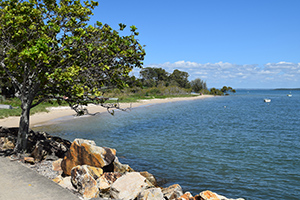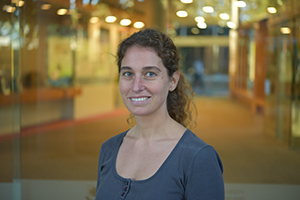Green Labs 2017 Showcasing Greener Labs
Martin Wynne—Moreton Bay Research Station

Martin Wynne joined the Green Labs Program in 2017, and has already begun implementing a number of sustainable practices at the Moreton Bay Research Station. After completing the new Green Labs representative training, Martin invited staff from the Green Labs Program to visit the research station, complete the Green Labs assessment and learn about the sustainability initiatives being undertaken within his lab.
The Moreton Bay Research Station makes use of containers in refrigerators to facilitate the easy identification of samples when a lab user finishes an experiment or moves on from the station. RO water stickers have been placed on lab sink splashbacks to remind staff to only use RO water when necessary, and ‘Switch Off and Save’ stickers have also been placed next to light switches. Cardboard, paper and most packaging materials are recycled within the lab. Martin has also used a data logger to monitor the energy consumption of a number of the station’s ‒80°C ULT freezers, using the information gained to educate his work colleagues on ULT freezers’ large energy demands.
Camila Orellana from the Australian Institute for Bioengineering and Nanotechnology

Camila Orellana signed up to become a Green Labs representative in 2016, aiming to reduce resource wastage in her lab at the Australian Institute for Bioengineering and Nanotechnology. Since joining the program, Camila has undertaken initiatives to increase her colleagues’ awareness of energy use within the lab by placing ‘Switch Off and Save’ awareness labels on equipment and communicating with colleagues.
Camila has also helped the Green Labs Program with the campaign to reduce the unnecessary usage of RO water by coming up with the idea of using awareness stickers and investigating the best location to place them. This campaign has not only helped reduce the use of RO water in Camila’s lab, but across the University. By making her colleagues aware that one litre of RO water takes five litres to produce, she has inspired change by helping others understand how everyday actions affect the environment.
In the near future, Camila hopes to improve recycling practices where possible in her lab. Despite the limitations of recycling in the PC2 lab, Camila would like to introduce soft-plastics recycling in her area. The abundance of soft plastic used to package new lab equipment and consumables can be recycled in the UQ soft-plastics recycling stream. Camila is also helping to reduce energy use at the institute by encouraging colleagues to use the stairs rather than the lift.
